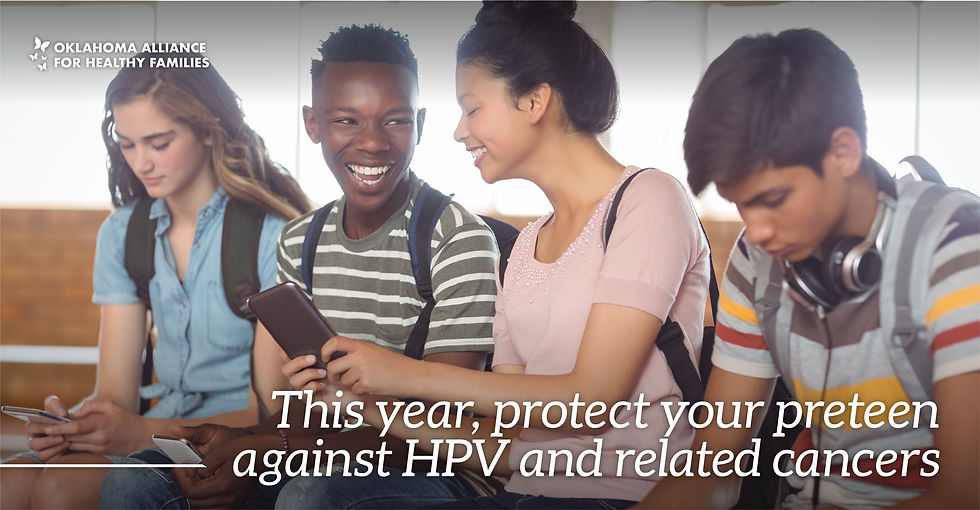This year, protect your preteen against HPV and related cancers
- Oklahoma Alliance For Healthy Families

- Feb 8, 2022
- 2 min read

In my role as a pediatrician, I often remind patients of the importance of regular well child visits, which are an ideal time to receive age-specific vaccinations.
Prevent cancer by vaccinating against HPV
Annual medical screenings are vital to your child’s health, and understanding the connection between human papillomavirus (HPV) and different types of cancer helps parents make informed decisions about the HPV vaccine.
While the National Cervical Cancer Coalition estimates human papillomavirus (HPV) causes 91% of cervical cancer cases the virus also correlates with other types of cancer, including cancers of the reproductive system and an estimated 70% of oropharyngeal cancers, which affect the throat, tongue and tonsils. The American Academy of Pediatrics recently published a statement recommending vaccination against HPV for pre-teens as young as 9.
HPV and related cancers affect men, women
HPV is the most common sexually transmitted infection (STI) in the U.S., according to the Centers for Disease Control and Prevention (CDC). Although the CDC reports nine out of 10 HPV cases go away on their own within two years, the remaining 10% are linked to cancer and infertility. In fact, leading research associates HPV with six types of cancer, including more than 35,000 cases each year in men and women, with an additional 200,000 cases of cervical precancer detected annually.
While the connection to cervical cancer may prompt the assumption HPV only affects women, the CDC reports four out of every 10 cases of related cancers occur in men. Men actually outrank women in the number of HPV-related throat cancer cases, which the CDC estimates exceed 11,000 cases in male patients and more than 2,000 cases in female patients. Infertility can also affect couples after women become infected from a male partner.
Vaccinate your preteen
The HPV vaccine is effective at preventing infection, which reduces the risk of cancer. The American Academy of Pediatrics recommends starting the two-dose series between ages 9 and 12. Young adults who have not already been immunized should talk with their health care professional about the vaccine.
The preteen age recommendation associated with the HPV vaccine aims to protect children before risk of exposure to the virus. The CDC estimates 90% of related cancers can be prevented by vaccination.
Protect your child for years to come
If you have questions about vaccinating your preteen against HPV, get expert answers at your next well child visit. Your pediatrician can offer science-based advice with facts, including what to expect after vaccination.
Protect your child’s health for years to come by choosing to vaccinate. HPV is just one of the many vaccines offering significant protection from illness. See the list of immunizations recommended through age 18.
The HPV vaccine is safe and effective. Find more information here.
May 2022 be filled with health and happiness, one good decision at a time.

_____________________________________________________________________
Dr. Eve Switzer is president of the Oklahoma Chapter of the American Academy of Pediatrics and a practicing pediatrician. She is a member of the Oklahoma Alliance for Healthy Families.




Using herbal natural remedy was what got me tested negative to HSV 2 after being diagnosed for years. I have spent so much funds on medications like acyclovir (Zovirax), Famciclovir (Famvir), and Valacyclovir (Valtrex). But it was all a waste of time and my symptoms got worse. To me It is very bad what Big pharma are doing, why keep making humans suffer greatly just to get profits annually for medications that don't work. I'm glad that herbal remedies are gaining so much awareness and many people are getting off medications and activating their entire body system with natural herbal remedies and they have become holistically healed totally. Quickly contact Dr Riaria herbal home now on his email. drriaria@gmail.com or WhatsApp him…